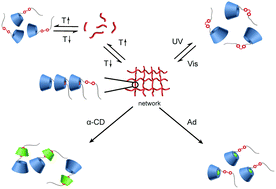Robust multi-responsive supramolecular hydrogel based on a mono-component host–guest gelator†
Abstract
Supramolecular hydrogels have been widely investigated, but the construction of stimuli-responsive mono-component host–guest hydrogels remains a challenge in that it is still hard to balance the solubility and gelation ability of the gelator. In this work, three azobenzene-modified β-cyclodextrin derivatives with different alkyl lengths (β-CD-Azo-Cn) have been synthesized. The length of the alkyl chain dramatically influences the solubility and gelation ability of β-CD derivatives in water. Among these derivatives, β-CD-Azo-C8 possesses the lowest minimum gelation concentration (MGC). Based on the host–guest interaction between β-CD and azobenzene units in aqueous solution, which is confirmed by UV-visible and ROESY NMR spectra, the gelators self-assemble and further interwine into networks through the hydrogen bonds on the surface of β-CD cavities. Hydrogels formed by mono-component gelators can collapse under external stimuli such as heating, competition guests and hosts, and UV irradiation. When the concentration of the gelator is more than 8 wt%, the hydrogel exhibits good self-supporting ability with a storage modulus higher than 104 Pa. The gel–sol transition temperature of the hydrogel is near body temperature, indicating its potential applications in biological materials.



 Please wait while we load your content...
Please wait while we load your content...